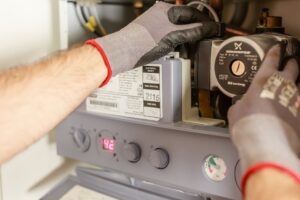Boiler problems can become stressful very quickly, especially when water starts leaking inside your home. Leaks are not just a sign of malfunction—they can also lead to water damage, property loss, or complete system failure if ignored. In Chester, where homeowners rely on boilers throughout the colder months, a leak is not something to put off. Even in the middle of summer, any malfunction in a boiler should be taken seriously to avoid long-term damage or higher repair costs later on. Spotting the first signs and taking quick action can go a long way in keeping things from getting worse.
When a boiler starts leaking, it’s usually a sign of something more serious happening inside the system. Whether it’s worn parts, incorrect water pressure, or internal damage, small leaks can quickly become big problems. Knowing what causes these leaks and how to handle them is key for any homeowner looking to keep their system running smoothly. The good news is you’re not alone—many homes in Chester face similar issues, and there are clear steps to deal with them.
Common Causes Of Boiler Leaks
Boiler leaks usually do not just happen out of nowhere. They develop over time or appear suddenly because a crucial part is no longer working the way it should. The issues can range from part wear to pressure imbalances. Here are some of the typical causes our technicians come across when inspecting leaking boilers in homes around Chester:
1. Corrosion and Rusting: Over time, internal components like the heat exchanger, valves, or pipes can begin to corrode. When this happens, tiny holes can form in the metal, allowing water to escape. This is especially common in older boilers.
2. Incorrect Water Pressure: Boilers work on a pressure system. If the pressure is too high, it can put stress on seals, valves, and joints, which may eventually crack or leak. If your boiler often has pressure fluctuations, leaking could soon follow.
3. Worn-Out Seals and Joints: Many parts inside a boiler are sealed with rubber or other materials. After years of heat exposure, these seals can dry out, crack, or simply wear away, opening up spots where water can escape.
4. Faulty Pumps or Valves: If pumps or pressure relief valves are not working correctly, it can cause water to collect where it should not. These parts are designed to control how water moves through the system, and when they fail, leaks often develop.
5. Issues With the Heat Exchanger: This is one of the most expensive parts of the system. Cracks in a heat exchanger can cause internal leaks that are sometimes hard to find but may lead to serious problems if ignored.
Leaks typically point to one or more of these root causes. Each requires a different repair strategy, and some may even call for part replacement to prevent the issue from returning. While it is helpful to know what is behind the leak, these types of problems usually do not fix themselves and can get worse quickly.
Warning Signs That Your Boiler Is Leaking
Catching a boiler leak early can save you from a messy repair and help maintain system efficiency. If you keep an eye out for warning signs, you can act before small issues turn into big repairs. While some signs are obvious, others are a bit more subtle. Here is what to look for in your Chester home:
1. Water Around the Base: The most obvious sign is water collecting on the floor near or under the boiler. It does not have to be a puddle—just a series of occasional damp spots can be an early indicator.
2. Low Boiler Pressure: If your boiler pressure is frequently lower than normal or needs to be reset often, that could mean water is leaking out somewhere in the system.
3. Unusual Sounds: Hissing, gurgling, or clunking noises coming from your boiler might suggest internal leaks or pressure problems. Boilers are not supposed to make much noise when operating normally.
4. Higher Utility Bills: A sudden unexplained increase in water usage could point to a hidden leak. The boiler may be losing water continuously, even if it is not obvious right away.
5. Visible Rust or Stains: If you notice rust or mineral buildup around pipe joints, vents, or drain spots, that often means water is escaping and drying up, leaving behind signs of corrosion.
One example we have seen is a homeowner who ignored slight noises coming from the boiler room for a few weeks. By the time they acted, the leak had caused water damage to the nearby drywall. If they had recognized the hissing sound and checked for moisture sooner, extensive repairs could have been avoided. That is why it is so important to stay alert and act as soon as something seems off.
Immediate Steps To Take When Your Boiler Leaks
Once you spot a leak, acting quickly can help limit damage and make your home safer. Boilers run under pressure and heat, and when there is water escaping, that balance is off. Even a slow drip can cause electrical risks, floor damage, or structural concerns if left too long. Here are the immediate steps homeowners in Chester should take to manage a leaking boiler before professional help arrives:
1. Turn Off the Water Supply: The first step is to stop more water from entering the system. Shut off the water feed to the boiler. Most systems have an isolation valve nearby, typically a small stop valve or lever. If you are unsure, shut off the main water supply to the home.
2. Shut Down the Boiler: Power down the boiler entirely. If it is still trying to heat while leaking, there is a risk of short circuits or overheating. Use the control panel to turn it off, or flip the corresponding breaker switch at your home’s circuit panel.
3. Collect the Leaking Water: Place a container or bucket underneath the leak to catch the drips. Laying towels around the base can also help prevent water from spreading to walls or flooring. Avoid using anything that cannot handle hot water, especially if the boiler was recently running.
4. Avoid Moving or Tinkering With Parts: Boilers are closed systems with complex parts. Trying to tighten valves or investigate inside the unit could cause more damage or void any warranty. It is best to wait and let a qualified professional handle the inspection and repair.
5. Ventilate the Room: If the boiler is in a closed room or basement, open a door or window to release any built-up humidity and heat. Trapped moisture can lead to mold growth over time, so it is a good step to minimize that risk.
Even after these actions, the system will stay out of service until the source of the leak is found and repaired. That is why reaching out immediately for professional repair is essential, especially if your home depends on the boiler year-round for hot water.
How Volpe Service Company Can Help
Leaking boilers do not always show where the problem starts. It takes a trained eye and the right instruments to find the root cause. When our professionals arrive at a home in Chester for boiler repair, the first step is a full inspection. This begins with checking visible components like the pressure relief valve, internal pipework, joints, and the heat exchanger. Sometimes the damage is internal and requires partial disassembly to reach.
Once the leak is pinpointed, the next step is repair. If a fitting is loose or a seal has worn down, it may be a simple replacement. If a key part like the pump or heat exchanger is failing, it may take more time and parts to fix. In situations where the same part has had repeated problems, upgrading that component may help prevent the issue from coming back again.
Scheduling regular maintenance can also reduce the chance of future leaks. During a tune-up or seasonal check, our technicians inspect for early signs of wear and damage. Fixing those weak spots before they cause trouble saves time and costs down the road. For homeowners in Chester, staying ahead of these issues means fewer emergencies and a longer-lasting boiler.
Ensuring Your Boiler’s Longevity
Once your system has been repaired, you will want it to keep running without more issues. Some steps can help homeowners extend the working life of their boiler and limit surprise breakdowns. Most are straightforward habits that involve keeping track of performance and booking regular maintenance.
1. Check Pressure Weekly When in Use: Boilers run best at a set pressure range. If you see the gauge dropping often, your system might have a slow leak or need to be refilled more frequently than normal.
2. Keep the Area Around the Boiler Clear: Let air circulate and avoid crowding the space. This prevents overheating and allows for easier access during inspections or service appointments.
3. Set a Maintenance Routine: Boilers benefit from an annual checkup, especially before heavy-use seasons. This is when our technicians can catch leaks before they spread and replace worn-down seals or parts.
4. Listen for Unusual Sounds: New noises can be the first clue something is not right. If your boiler starts clanking, hissing, or rumbling, schedule service right away.
5. Watch for Short Cycling: If your boiler turns on and off too quickly, it may be struggling to maintain pressure or heat levels, which can lead to part failures. This is often a sign the system needs adjustment.
Keeping up with these habits makes it less likely you will face another leak or sudden boiler failure. Homeowners who stay observant and act fast tend to avoid the more costly problems caused by delayed response.
Boiler Leaks in Chester: Quick Solutions & Long-Term Prevention
For homeowners in Chester, dealing with a leaking boiler can be unsettling. But when handled quickly and correctly, the damage can be limited and future problems reduced. From the first signs like damp spots or pressure drops to the moment leak repairs are completed, there is a clear process to follow that protects your home, cuts down repair costs, and keeps your boiler operating safely.
The key takeaway is this: do not wait. Boiler leaks are more than just a maintenance issue. They are a warning that something is going wrong behind the scenes. By spotting issues early, taking the right short-term steps, and partnering with trained professionals, you can stay ahead of costly damage and enjoy steady heat and hot water when you need it most.
If your home shows any signs of a leak and you need reliable boiler repair in Chester to prevent further damage, Volpe Service Company can help you address the issue quickly and effectively to maintain comfort and safety in your home. For a quick estimate or to book a service visit, please contact us today.





